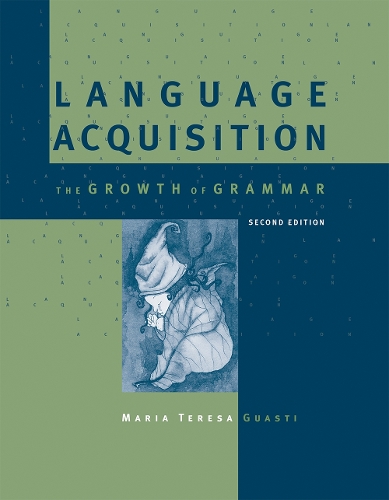
Language Acquisition: The Growth of Grammar
(Paperback, second edition)
Publishing Details
Language Acquisition: The Growth of Grammar
By (Author) Maria Teresa Guasti
MIT Press Ltd
Bradford Books
10th February 2017
second edition
United States
Classifications
Tertiary Education
Non Fiction
Language learning: grammar, vocabulary and pronunciation
401.93
Physical Properties
Paperback
672
Width 178mm, Height 229mm, Spine 29mm
Description
The new edition of a comprehensive introduction to a rapidly developing field, combining developmental data with theory.How do children begin to use language How does knowledge of language emerge in early infancy, and how does it grow This textbook offers a comprehensive introduction to knowledge acquisition, drawing on empirical evidence and linguistic theory. The theoretical framework used is the generative theory of Universal Grammar; students should have some familiarity with concepts in linguistic research. Aimed at upper-level undergraduate and graduate students, the book offers end-of-chapter summaries, key words, study questions, and exercises. This second edition has been thoroughly updated, with new content throughout. It has been reorganized according to the three main components of language acquisition. The computational components and the interfaces are covered in chapters on structure building in the verbal and nominal domains, movement-derived structure, and the relation between syntax and semantics and semantic and pragmatic. The sensory motor interface is treated in chapters on infants' perception of language and on the acquisition of words. The intentional-conceptual interface is discussed in chapters on the acquisition of words. This edition features additional cross-linguistic content, a new focus on brain imaging findings and the motor aspect of language, new material on Williams and Down Syndromes and dyslexia, and a new chapter on bilingualism, early second language acquisition, and bimodalism. Revisions reflect the burgeoning research in the field. New pedagogical features include chapter outlines, summaries of chapters, hypotheses, and linguistic milestones; methodological information; explanatory boxes; and suggestions for further reading.
Reviews
""One of the greatest assets of this is that it vividly shows the interplay of hypothesis-construction and fact-finding in the research on acquisition.... [It} will convince many readers that theoretically inspired research in language acquisition is today one of the liveliest and most exciting research paradigms within cognitive science."
Author Bio
Maria Teresa Guasti is Professor in the Department of Psychology at the University of Milan-Bicocca.
